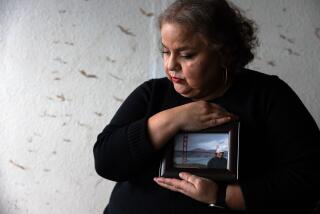How Visa System Failed to Flag Lodi Imam
SACRAMENTO — As Shabbir Ahmed sits in the county jail on immigration charges connected to an FBI terrorism investigation, federal officials are at a loss to explain how a man who publicly demonstrated his rage against the United States and advocated violence against the U.S.-backed regime in Pakistan could slip so easily through the State Department visa system.
In October 2001, after U.S. military aircraft began bombing Al Qaeda bases and Taliban strongholds in Afghanistan, Ahmed -- then a 35-year-old imam of a small mosque in Islamabad -- was one of the main speakers at an anti-U.S. demonstration at a market near the U.S. Embassy in the Pakistani capital.
While demonstrators burned American flags and effigies of President Bush, Pakistan Press International news service reported that the slight, bearded Muslim cleric exhorted the crowd to join a jihad, or holy war, against the United States.
A month later at another rally, the Boston Globe quoted Ahmed as calling for a rebellion against Pakistan’s president, U.S. ally Gen. Pervez Musharraf: “Whoever is against Islam,” said Ahmed, “we will destroy him. If this is rebellion, we are not afraid of rebellion. Blood is going to be spilled in Pakistan.”
These events were widely reported by Pakistani and foreign media. But a short time later, probably in January 2002, Ahmed walked into the consular section of the heavily fortified U.S. Embassy compound, where he was granted an uncontested three-year “religious worker” visa to the United States.
He arrived in San Francisco on Jan. 23, 2002, and immediately assumed a position as imam of a Lodi, Calif., mosque that is the center of religious life for that San Joaquin Valley city’s large Pakistani American immigrant community. Since then he has made at least two trips back to his native Pakistan.
At an immigration hearing June 24 in San Francisco, Ahmed admitted making the anti-American speeches but said he had since completely changed his opinion about the United States, which he said he now loves and respects.
“He now regrets that he made those statements,” said his attorney, Saad Ahmad.
But federal prosecutors, who allege links between Ahmed and Pakistan’s banned Harkat-ul-Moujahedeen political party, are not convinced. They have asked Immigration Judge Anthony Murry to deny bail to Ahmed pending a deportation hearing later this year.
After reading reports about the Islamabad speeches, the leadership of the Lodi mosque where Ahmed worked fired him at a special meeting June 26. “We don’t want that kind of person who has spoken against the United States,” mosque President Mohammed Shoaib told Associated Press.
The man who sponsored Ahmed for the Lodi job -- former Imam Mohammad Adil Khan -- is also jailed without bond on immigration charges, as is Khan’s 22-year-old son, Mohammad Hassan Adil.
All three men came into the country on R-1 or R-2 religious worker visas. R-2 visas are for spouses and children of R-1 visa holders.
How Ahmed’s public pronouncements against the United States went unnoticed remains an unanswered question.
Before his name surfaced as part of an FBI investigation of people in the Lodi area with alleged terrorist ties, Ahmed had had at least four encounters with U.S. officials without setting off any alarms.
The first was with U.S. consular officers at the embassy in Islamabad.
Obtaining a religious worker visa requires a sponsor in the U.S. who promises such a job for the applicant and guarantees a steady source of income.
In Ahmed’s case the sponsor was the Lodi mosque, then under the direction of Mohammad Adil Khan. Khan was Ahmed’s teacher for many years at Jamia Farooqia, a madrasa, or Islamic school, in Karachi, Pakistan.
Like many madrasas across that nation, Jamia Farooqia had strong connections to the Taliban movement in Afghanistan. “Taliban,” in fact, means “religious students.”
The school, founded by Khan’s father, Salimullah Khan, also has at least a historical connection to Harkat-ul-Moujahedeen. The party had fought Soviet troops in Afghanistan from 1980 to 1988 but by 2001 had been listed as a terrorist organization by the U.S. government.
None of this background appears to have reached consular officers when they considered Ahmed’s visa request in early 2002.
Likewise, if intelligence agents or political officers at the U.S. Embassy in Islamabad had noted Ahmed’s active participation in anti-U.S. rallies in October and November 2001, they failed to pass the information on to the consular officers.
“In every instance in which we have specific information when an individual intends to do harm to the U.S. or to U.S. citizens, we deny the visa,” said Angela Aggelar, spokeswoman for the State Department’s Bureau of Consular Affairs. “But in order for a person not to be eligible for a visa, they have to have done something that was reported to us by law enforcement.”
Ahmed was also screened by airport immigration and customs officials at the San Francisco airport when he first entered the country and each time he returned from trips to Pakistan.
But it was not until Nov. 15, 2004 -- when the Lodi mosque applied for a two-year extension of Ahmed’s visa -- that his name showed up on a watch list. This was after the FBI’s Sacramento office had launched an investigation of alleged terrorist links in Lodi.
By the time federal immigration attorneys arrived in court for the June 24 hearing, they had a complete dossier on Ahmed, including his writings in the Jamia Farooqia magazine and his speeches before the Islamabad crowds.
“Did you encourage people in Pakistan at least five times to go to Afghanistan and kill Americans?” federal attorney Paul Nischiie asked Ahmed. “Did you encourage people to defend Osama bin Laden?”
At the hearing, Ahmed initially answered no to both questions, but he later admitted to making anti-U.S. statements.
Officials in Washington with Homeland Security, Citizenship and Immigration Services, Immigration and Customs Enforcement and the State Department had no explanation for why the same questions were not asked three years earlier when Ahmed first presented himself at the U.S. Embassy seeking a visa.
Part of the problem, noted in the 9/11 Commission Report, was that different federal agencies did not communicate well with each other. The Department of Homeland Security was not created until March 2003.
Russ Knocke, a spokesman for Homeland Security, said someone with a similar background would be much more likely to be identified today.
“It shows you how much has changed,” he said.
Consular Affairs spokeswoman Aggelar pointed to the limited resources available to the embassy at the time of Ahmed’s first visa request.
In the months immediately after the Sept. 11, 2001, terrorist attacks, Aggelar said, the consular database contained 7 million names. The watch list has expanded to more than 20 million names under a new heightened security system in which many more people are likely to be flagged.
This explanation is unlikely to satisfy congressional critics of the consular screening process.
“The State Department’s excuse that they didn’t have a functioning terrorist list is inadequate,” said Rep. Tom Tancredo (R-Colo.), a critic of immigration policy. “If State thought it was important enough, they would have relayed the message by phone, e-mail, smoke signal or carrier pigeon.”
Tancredo, a former Denver schoolteacher, believes that terrorists enter the country using a network that includes imams granted entry on R-1 religious worker visas.
In the 15 years since the R-1 category was established in 1990, more than 145,000 religious worker admissions have been recorded by U.S. immigration authorities.
In fiscal year 2002, the same year that Ahmed came into the country, immigration records show 53 R-1 admissions from Pakistan.
Only relatively recently have federal law enforcement agencies begun to concentrate on investigations of Muslim clerics holding religious worker visas.
Last fall, 62-year-old Muhammad Khalil, imam of a basement mosque in Brooklyn, N.Y., was convicted in federal court of fraudulently sponsoring more than 200 applications for Pakistani religious workers for his Dar Ehya Essunah mosque.
In January, Wagdy Mohammed Ghoneim, the Egyptian head of an Orange County mosque, left the country with his wife and seven children rather than face deportation hearings on immigration charges.
More to Read
Sign up for Essential California
The most important California stories and recommendations in your inbox every morning.
You may occasionally receive promotional content from the Los Angeles Times.










